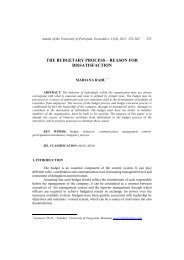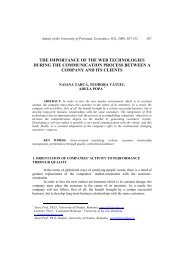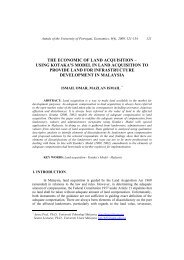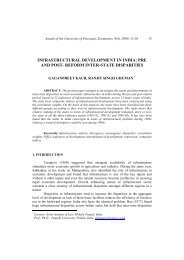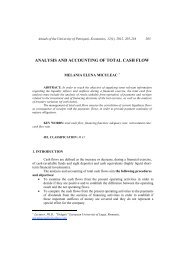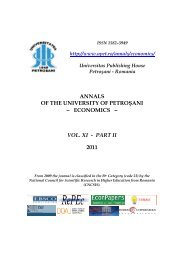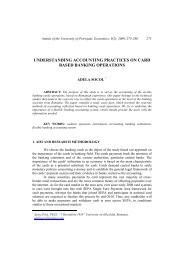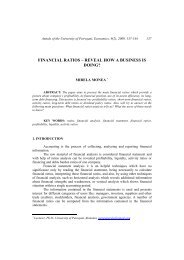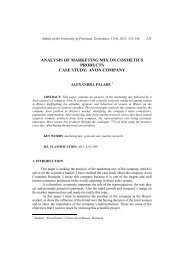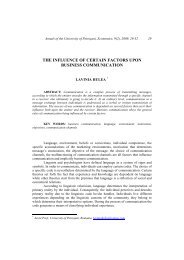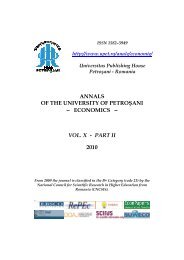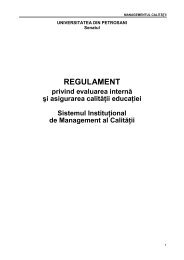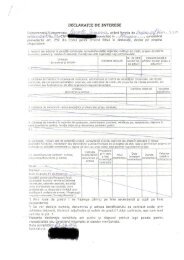annals of the university of petroÅani â¼ economics â¼ vol. xi - part i ...
annals of the university of petroÅani â¼ economics â¼ vol. xi - part i ...
annals of the university of petroÅani â¼ economics â¼ vol. xi - part i ...
Create successful ePaper yourself
Turn your PDF publications into a flip-book with our unique Google optimized e-Paper software.
Internal Controls in Ensuring Good Corporate Governance in … 195<br />
<strong>the</strong> day in <strong>the</strong>se financial institutions. However a number <strong>of</strong> factors discussed below<br />
have been militating against <strong>the</strong> soundly implementation <strong>of</strong> effective internal controls.<br />
Borerwe (2004) saw economic confusion in <strong>the</strong> last decade in Zimbabwe,<br />
insatiable appetite for riches, corruption and double standards by senior management<br />
who preach good corporate governance during <strong>the</strong> day and do not walk <strong>the</strong>ir talk by<br />
awarding <strong>the</strong>mselves heft packages which when it comes to <strong>the</strong> attention <strong>of</strong> workers<br />
would see management as insensitive and thus <strong>the</strong>y will work towards evading internal<br />
controls so that <strong>the</strong>y <strong>the</strong>mselves will get rich.<br />
There should be board oversight responsible for ensuring <strong>the</strong> following in<br />
financial institutions:<br />
- Ensuring that senior management has not only developed but <strong>the</strong>y have also<br />
implemented a properly structured internal control system.<br />
- Periodic discussion with senior management concerning <strong>the</strong> effectiveness <strong>of</strong> <strong>the</strong><br />
internal control system is held.<br />
- Ensuring timely reviews <strong>of</strong> evaluations <strong>of</strong> internal controls are performed by internal<br />
and external auditors.<br />
- Periodic checks to ensure that management has promptly acted on recommendations<br />
and concerns expressed by auditors and regulatory authorities on internal control<br />
weakness.<br />
For <strong>the</strong> internal controls to be effective <strong>the</strong>y do not only need to be precise and<br />
well presented for everyone to know, but <strong>the</strong>re also needs to be appointed compliance<br />
<strong>of</strong>ficers whose mandate is to oversee compliance issues. They should be equipped with<br />
necessary skills and expertise, <strong>the</strong> level <strong>of</strong> which should be commensurate with <strong>the</strong><br />
comple<strong>xi</strong>ty <strong>of</strong> <strong>the</strong> institutions activities. Cook (2002) suggested that <strong>the</strong> board and<br />
senior management <strong>of</strong> Banks are responsible for promoting high ethical and integrity<br />
standards and for establishing a culture within that organization that emphasizes and<br />
demonstrates to all levels <strong>of</strong> personnel <strong>the</strong> importance <strong>of</strong> internal controls. All<br />
personnel at a bank need to understand <strong>the</strong>ir role in <strong>the</strong> internal controls systems and be<br />
fully engaged in <strong>the</strong> system.<br />
8. CONCLUSION<br />
The results obtained from <strong>the</strong> research clearly support <strong>the</strong> assertion that <strong>the</strong><br />
effectiveness internal control systems contributed to a greater extent to good corporate<br />
governance in financial institutions in Zimbabwe. Therefore effective internal controls<br />
contribute to better performance by financial institutions. The success <strong>of</strong> <strong>the</strong> system<br />
depends on positive internal control culture. Banks should have in place a<br />
comprehensive internal control management process to identify, measure, monitor and<br />
control internal control system effectiveness and compliance. There is also need for<br />
financial institutions to cultivate a culture <strong>of</strong> ethically doing business from <strong>the</strong> top<br />
management which should see this culture cascading down to he most junior worker or<br />
employee in <strong>the</strong> organization so as to promote adherence to internal controls <strong>of</strong> <strong>the</strong><br />
organization which are essentially management tools on measuring compliance to an<br />
organizations way <strong>of</strong> doing business in a competitive environment.



